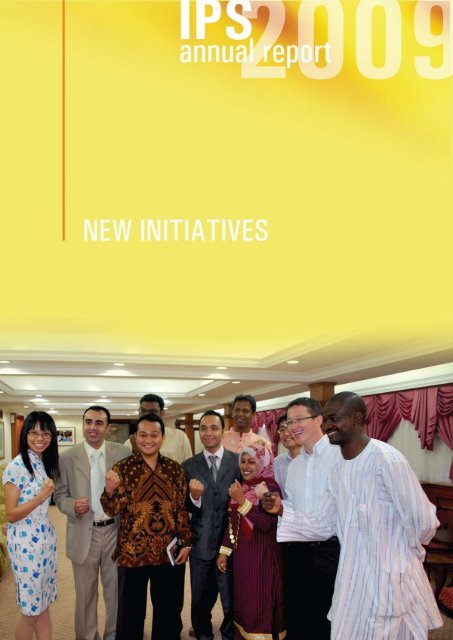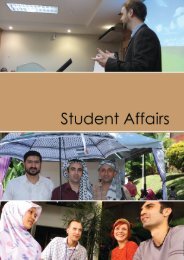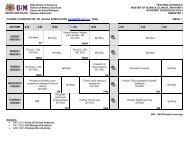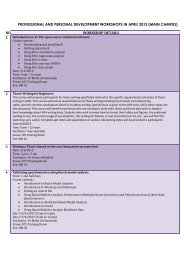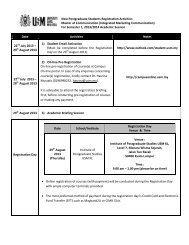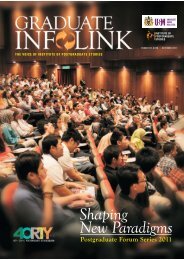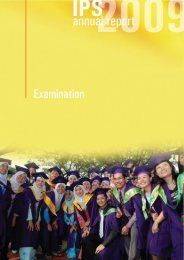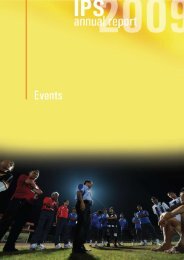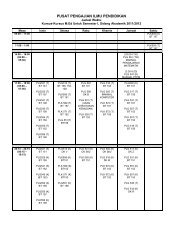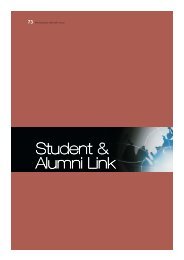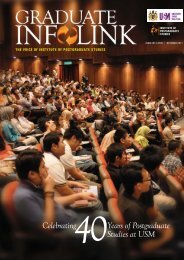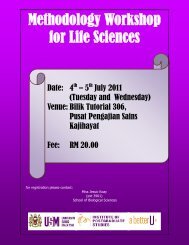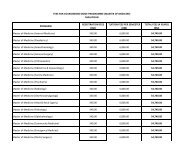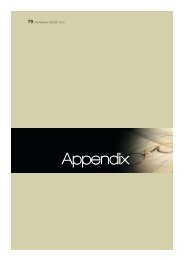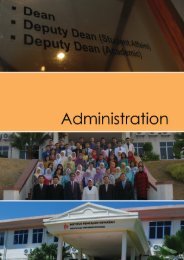new initiatives - Institute of Graduate Studies - USM
new initiatives - Institute of Graduate Studies - USM
new initiatives - Institute of Graduate Studies - USM
You also want an ePaper? Increase the reach of your titles
YUMPU automatically turns print PDFs into web optimized ePapers that Google loves.
IPS Annual Report 2009 1
INTERNATIONAL ACADEMIC GRADE GUIDE<br />
The International Academic Grade Guide is a result <strong>of</strong> a comprehensive process and<br />
research carried out by the <strong>USM</strong> International Grade Equivalent Committee, chaired<br />
by Pr<strong>of</strong>essor Boey Peng Lim. The document contains background details <strong>of</strong> the respective<br />
countries’ education system, key institutions, grading systems and recommended<br />
equivalent grades for postgraduate admission in <strong>USM</strong>. The grades are normalized to<br />
<strong>USM</strong>’s grading system. Recommendations are made regarding to grade equivalent to<br />
<strong>USM</strong>’s minimum admission requirement <strong>of</strong> CGPA 2.75 in a 4-point CGPA scale.<br />
The first edition <strong>of</strong> the International Academic Grade Guide was endorsed by the <strong>USM</strong><br />
Senate as a guideline to the Schools/Centers <strong>of</strong> Excellence(COEs) in appraising the<br />
academic credentials <strong>of</strong> applicants from various nations.<br />
POSTGRADUATE STUDENT AMBASSADORS<br />
To quote Socrates, the great philosopher “The root <strong>of</strong> education is bitter but the fruit is sweet”. The pilgrimage to<br />
obtain knowledge in a strange country could almost be sacred. However, the barriers that lie ahead, especially the<br />
social and cultural ones should never be overlooked.<br />
One’s aspiration to excel by furthering his/her studies overseas is <strong>of</strong>ten overshadowed by the insecurities <strong>of</strong> venturing<br />
into an unknown territory. It may hinder one’s quest to gain knowledge.<br />
However, imagine having a group <strong>of</strong> fellow students appointed to assist one’s noble quest. These students are trained<br />
to guide and assist one’s voyage towards excellence and are always ready to clear one’s doubts, whether it is on<br />
local food or cultures.<br />
IPS believes that a Student Ambassadors Programme (SAP) will provide a platform for international and local students<br />
to receive and exchange information. Launched during the Welcoming and Oath taking ceremony at Dewan<br />
Tuanku Syed Putra (DTSP) in August <strong>of</strong> 2009, SAP was introduced to facilitate and encourage <strong>new</strong> international<br />
students as well as existing ones fit into life at <strong>USM</strong> by providing them with reality based information mediated by<br />
the selected ambassadors.<br />
The student ambassadors are Mehran Nejati Ajibisheh (Iran), Elmuradov Dilshod Baynazarovich (Uzbekistan), Yudi<br />
Fernandao (Indonesia), Annegowda Hardur Venkatappa (India), Pan Zheng (China), Muath Naser Mohammad Asmar<br />
(Palestine), Mohmmed Aliyu Paiko (Nigeria), Mahbub Ahsan Khan (Bangladesh) and Aishath Rameela (Maldives). Malaysia<br />
has three student ambassadors and they are the IPS Student Representative, Yus<strong>of</strong> Nordin, Ravi Mahalinggam<br />
and Koay Ee Ling.<br />
Mohammed Aliyu Paiko from Nigeria, a PhD candidate for Aquaculture Nutrition, School<br />
<strong>of</strong> Biological Sciences said, previously there were only 10 to 12 Nigerian students registered<br />
in <strong>USM</strong>, including the Engineering and Medical Campus located at Nibong Tebal and<br />
Kubang Kerian, respectively. Lately, he said, there has been an increase in the number <strong>of</strong><br />
Nigerians in <strong>USM</strong> reaching to almost 35 students.<br />
According to him, this is due to the availability <strong>of</strong> reality based information provided by<br />
the former batch <strong>of</strong> students here. The availability <strong>of</strong> such information facilitates and<br />
encourages potential students to choose Malaysia, namely <strong>USM</strong> as their education ground.<br />
2 IPS Annual Report 2009
NEW INITIATIVES<br />
“Existing students would sometimes be scared and unsure to approach varsity <strong>of</strong>ficials on things such as administrative<br />
procedures. So, we act as the source <strong>of</strong> information or the medium to convey them,” he said.<br />
“The real challenge, however, is to convey the right message to them,” he added.<br />
These ambassadors therefore, can be considered as assets in fulfilling one <strong>of</strong> the goals in the Accelerated Programme<br />
for Excellence (APEX), that is, to increase the intake <strong>of</strong> international students for postgraduate studies.<br />
The selection processes be an ambassador however is rigourous. They were required to undergo three rounds <strong>of</strong> selections.<br />
The first involves the submission <strong>of</strong> curriculum vitae (CV) by interested individuals. Short listed candidates,<br />
then, undergo a written test concerning campus and local culture knowledge. Finally, successful applicants must take<br />
part in a brain storming session where they would be grouped regionally.<br />
“We were divided into four to five groups, mostly according to our region such as Middle<br />
East etc. And we were left to debate over issues and topics as our presentation were<br />
evaluated,” explained Mehran Nejati.<br />
Mehran Nejati who is a Research Mode PhD Student in the School <strong>of</strong> Management hopes<br />
this programme can facilitate the flow <strong>of</strong> information for applicants to <strong>USM</strong> worldwide<br />
and lead to talented students coming to <strong>USM</strong> to be postgraduates. Hopefully this flow<br />
can be sustained and nurtured.<br />
Whereas, Muath Naser Mohammad Asmar from Palestine, a PhD candidate at the<br />
Finance Section, School <strong>of</strong> Management, said that he found being a student ambassador<br />
very interesting. He even has students calling him up three times a day, asking for help<br />
on various issues.<br />
In a nutshell, the move to appoint a group <strong>of</strong> ambassadors is proactive in disseminating<br />
accurate information on <strong>USM</strong>. As a result, potential students, preferably postgraduate<br />
ones would find Malaysia, <strong>USM</strong> especially, an accessible education base.<br />
As the Dean <strong>of</strong> IPS, Pr<strong>of</strong>. Roshada Hashim mentioned in her speech during the oath taking ceremony in DTSP,<br />
“Postgraduate students are indeed the core <strong>of</strong> a university as they play a vital role in ensuring the success <strong>of</strong> its research<br />
and innovation agenda. The collective outputs from your research are the most precious asset <strong>of</strong> the university<br />
and are critical to <strong>USM</strong>’s journey towards achieving its international status”.<br />
IPS Annual Report 2009 3<br />
<strong>USM</strong>’s pioneer Student Ambassadors
NEW INITIATIVES<br />
BEST PRACTICES IN SUPERVISION<br />
IPS formed a committee chaired by Pr<strong>of</strong>essor Abdul Rashid Abdul Aziz from the School <strong>of</strong> Housing, Building and<br />
Planning to look into the best practices in the supervision <strong>of</strong> postgraduates. The committee members are:<br />
Pr<strong>of</strong>essor Bahruddin Saad<br />
School <strong>of</strong> Chemical Sciences<br />
Pr<strong>of</strong>essor Syed Hatim Noor<br />
School <strong>of</strong> Medical Sciences<br />
Pr<strong>of</strong>essor Susie See Ching Mey<br />
School <strong>of</strong> Educational <strong>Studies</strong><br />
Pr<strong>of</strong>essor Radzali Othman<br />
School <strong>of</strong> Materials and Mineral Resources Engineering<br />
Pr<strong>of</strong>essor Chan Lai Keng<br />
School <strong>of</strong> Biological Sciences<br />
Assoc. Pr<strong>of</strong>. Abdul Rahman Othman<br />
<strong>Institute</strong> <strong>of</strong> Postgraduate <strong>Studies</strong><br />
Assoc. Pr<strong>of</strong>. Shakila Abdul Manan<br />
School <strong>of</strong> Humanities<br />
Assoc. Pr<strong>of</strong>. Ishak Hj. Abdul Azid<br />
School <strong>of</strong> Mechanical Engineering<br />
Ms. Cik Izyan Yahaya (ASTS Fellow)<br />
School <strong>of</strong> Housing, Building and Planning<br />
The role <strong>of</strong> this committee is to :<br />
1. plan a strategy in developing the “Best Practices in Supervision” modules that will be adopted<br />
by <strong>USM</strong> staff who supervise postgraduate candidates.<br />
2. ensure that the “Best Practices in Supervision” modules used be comprehensive and able to<br />
improve the quality <strong>of</strong> supervision <strong>of</strong> candidates.<br />
3. ensure that the modules are updated regularly making them relevant and efficient tools to<br />
maintain the quality <strong>of</strong> supervision.<br />
4. propose to the university policies that should be implemented in improving and strengthening<br />
the quality <strong>of</strong> postgraduate supervision at <strong>USM</strong>.<br />
4 IPS Annual Report 2009
The committee summarized that the best practices in supervision <strong>of</strong> postgraduates can be divided into four areas.<br />
They are:<br />
• Selection <strong>of</strong> Candidates and Supervisors, and Issues Pertaining to Enrolment<br />
• Research Framework<br />
• Research Progress<br />
• Writing up the Research<br />
In order to improve and sustain the quality <strong>of</strong> supervision <strong>of</strong> postgraduates by <strong>USM</strong>’s academic staff, the committee<br />
proposed regular workshops focusing on these four areas. Training modules on these areas were subsequently<br />
planned, written and used in the workshops. Details and contents <strong>of</strong> the four modules were discussed at a workshop<br />
on Supervision <strong>of</strong> Postgraduate Students, held on 2 – 3 October 2009, at the Equatorial Hotel, Penang which was<br />
attended by 42 academic staff.<br />
Also present at the workshop was Dr. Catherine Manathunga from the University <strong>of</strong> Queensland who was appointed<br />
as a consultant for the development <strong>of</strong> the Best Practices in Supervision Modules which is based on the University <strong>of</strong><br />
Queensland model. During her visit she conducted a workshop on Responsible Supervision for Postgraduate Students<br />
at IPS.<br />
Consequently, the first “Best Practices in Supervision” workshop for academic staff on Research Progress was<br />
held on 1 December 2009. Participants were exposed to procedures, techniques and best practices with regard to<br />
a student’s research progress. This was done through a series <strong>of</strong> open discussions, lectures, focus groups and quizzes.<br />
In addition, participants were also presented with case studies according to their disciplines to expose them to<br />
realistic scenarios during the course <strong>of</strong> supervising a student. This workshop was attended by 45 participants from<br />
17 Schools/COEs. The participants were academic staff with less than 7 years <strong>of</strong> supervisory experience.<br />
THESIS EXAMINATION AND VIVA VOCE EXAMINATION PROCESSES<br />
NEW INITIATIVES<br />
The University Senate approved the <strong>new</strong> proposal for the thesis and viva voce examination processes. The <strong>new</strong><br />
proposal for the thesis examination process specifies three evaluation levels, namely “Pass, “Reevaluation” and “<br />
Fail” to replace the current evaluation which was based on a scale <strong>of</strong> 1 – 4. With this, it is anticipated that confusion<br />
regarding the follow up actions to be undertaken after the viva voce examination panel by the candidate can be<br />
reduced if not, completely addressed.<br />
Consequently, the Senate agreed to approve the <strong>new</strong> proposed recommendations <strong>of</strong> an examined thesis to be as<br />
follows:<br />
Pass<br />
The candidate is awarded a PhD/Masters Degree subject to changes/ corrections to the thesis as listed in the Panel<br />
<strong>of</strong> Examiners’ report.<br />
Reevaluation<br />
The candidate is allowed to re-submit the thesis for re-examination after the candidate has made changes/corrections<br />
to the thesis as listed in the Panel <strong>of</strong> Examiners’ report. The thesis must be re-examined and the candidate must attend<br />
another viva voce.<br />
Fail<br />
The candidate is not awarded a PhD/Masters Degree and is not allowed to re-submit the thesis for examination.<br />
IPS Annual Report 2009 5
NEW INITIATIVES<br />
TERMS AND REFERENCE FOR THE VIVA VOCE EXAMINATION PANEL<br />
The main focus <strong>of</strong> IPS is to ensure that a candidate’s viva voce examination is conducted<br />
in a systematic and an effective manner by the Examination Panel. To achieve this<br />
objective, IPS prepared the Viva Voce Guide, a comprehensive guideline as a reference<br />
for the panel during the viva voce examination. This complete guide defines the roles <strong>of</strong><br />
the Chairperson, the Examiners, the Dean or the Dean’s Representative, the Supervisor,<br />
the Co-supervisor(s) and the Assistant Registrar acting as the Secretary <strong>of</strong> the panel<br />
throughout the viva voce.<br />
FORMATION OF MARKETING ADVISORY PANEL FOR IPS<br />
The advisory panel was formed to strategically plan and implement marketing activities for the university’s postgraduate<br />
programme. The roles <strong>of</strong> the panel are to:<br />
1. advice IPS on marketing affairs covering promotion, communication and image building.<br />
2. evaluate the effectiveness <strong>of</strong> the marketing programmes<br />
3. spearhead marketing programmes introduced<br />
The panel members are:<br />
• Pr<strong>of</strong>. Osman Mohammad, Chairperson<br />
• Pr<strong>of</strong>. Roshada Hashim<br />
• Pr<strong>of</strong>. Badaruddin Mohammed<br />
• Pr<strong>of</strong>. Fauziah Md. Taib<br />
• Assoc. Pr<strong>of</strong>. Adnan Hussein<br />
• Assoc. Pr<strong>of</strong>. Wan Fauzy Wan Ismail<br />
• Mr. Alias Ibrahim<br />
• Mr. Abd Hamid Majid<br />
• Ms. Marina Mohammad, Secretary<br />
The panel proposed two projects:<br />
1. Attracting quality postgraduate students into <strong>USM</strong><br />
2. Corporate video and Web TV led by Pr<strong>of</strong>. Badaruddin Mohammed and Assoc. Pr<strong>of</strong>. Adnan Hussein,<br />
respectively<br />
6 IPS Annual Report 2009
NEW INITIATIVES<br />
PROCEDURE FOR THE IMPLEMENTATION OF THE ALTERNATIVE METHOD FOR THE<br />
SUBMISSION OF PhD THESES BY RESEARCH MODE CANDIDATES<br />
To ensure the implementation <strong>of</strong> the alternative PhD thesis examination method for research mode candidates is carried<br />
out effectively and efficiently, the University Senate approved the procedures for its implementation<br />
(Appendix A).<br />
The following is a brief outline <strong>of</strong> the process for the alternative method for the submission <strong>of</strong> PhD thesis by Research<br />
Mode referred to as the Thesis and Publication Route.<br />
Documentation:<br />
1. The content <strong>of</strong> the thesis is an integration <strong>of</strong> a collection <strong>of</strong> published articles<br />
2. The number <strong>of</strong> published articles in the collection must be at least three. They must be published<br />
in refereed publications present in a list recommended by School/Centers <strong>of</strong> Excellence(COEs)<br />
3. In the Arts, one <strong>of</strong> the publications has to be a refereed journal. The other two can be any<br />
publications present in the list recommended by the Schools/COEs<br />
Examination Mechanism:<br />
1. The thesis is examined by one internal examiner and one external examiner<br />
2. A viva voce will be held<br />
Examination Panel:<br />
The examination panel will be comprised <strong>of</strong>:<br />
1. The Chairperson<br />
2. The Dean/representative <strong>of</strong> the Dean<br />
3. The External Examiner<br />
4. The Internal Examiner<br />
5. The Supervisor and the Co-supervisor<br />
6. The Assistant Registrar<br />
Thesis Content: 25,000 to 40,000 words<br />
Remarks:<br />
1. Publications in the form <strong>of</strong> reviews are unacceptable. In the event that a School/COE wants to<br />
allow such publications, then the School/COE must give a strong justification<br />
2. Publications must be relevant to the submitted thesis<br />
3. Publications must be published during the candidature period<br />
4. The format <strong>of</strong> the thesis follows the traditional thesis<br />
5. A Special Evaluation Committee (SEC) at the School/COE will evaluate and approve the<br />
application to submit a thesis by this method<br />
6. Final approval must be obtained from the MPSU<br />
IPS Annual Report 2009 7


